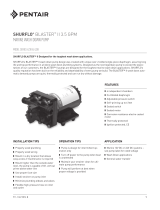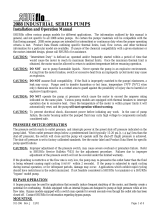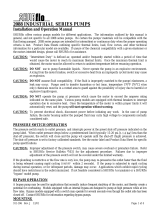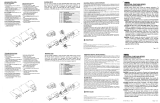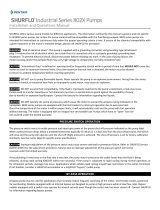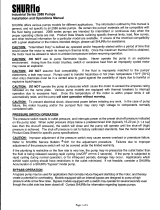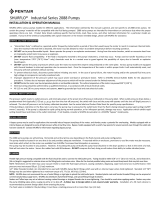Page is loading ...

SHURFLO
®
AQUA KING
™
II 2.0 GPM & 3.0 GPM
MARINE FRESH WATER PUMP
MODEL SERIES 4128 2.0 GPM AND 4138 3.0 GPM
FLOW MANAGEMENT SOLUTIONS 911-1052 REV. C 1
SHURFLO AQUA KING™ II Delivers smooth quiet fl ow.
SHURFLO’S New 4128 and 4138 series fresh water pump design was created with unique over-molded single-piece diaphragm
and internal by-pass, assuring long life and top performance in all plumbing systems. Designed as the next legendary pump to
exceed the expectations of our customers, the 4128 and 4138 series pumps are constructed for medium fl ow demand, smooth
fl ow and no rapid cycling. Our quality reputation has been built on the reliability and dependability of every pump we build. The
4128 and 4138 series fresh water automatic demand pumps are quiet, thermally protected and can run dry without damage.
INSTALLATION TIPS
❚ Properly sized plumbing
❚ Mount on a solid surface within 6 feet
of tank
❚ Properly sized wiring
❚ Use proper fuse size
❚ Install strainer on pump inlet
❚ Dry and accessible location
❚ Minimize plumbing elbows and valves
❚ Flexible high-pressure hose on inlet
and outlet
❚ No accumulator needed
OPERATION TIPS
❚ Pump is designed for intermittent
operation only
❚ Turn off power to the pump when boat
is unattended
❚ Keep your strainer clean for ultimate
pump performance
❚ Do not use pump with a Reverse
Osmosis filtration system
APPLICATION
❚ Marine 12V DC or 24V DC fresh water
systems – see pump label for rated
voltage
❚ For 4138 3 GPM models, up to 3
fi xtures and up to 2 fi xtures for 4128, 2
GPM models
❚ General fresh water transfer
❚ Pressurized water systems in cabins
FEATURES
❚ 4 independent chambers
❚ Co-Molded diaphragm
❚ Adjustable pressure switch
❚ Self-priming up to 6 feet
❚ Dry run capability
❚ Sealed switch
❚ Sealed motor
❚ Corrosion resistant electro coated
motor
❚ Thermally protected
❚ Ignition protected, CE

2
MOUNTING
❚ Mount the pump within 6 feet (Max) of
the tank for best performance and pump
life. The pump will pull farther, but the
farther it pulls the more work it does,
increasing vibration and noise, and
reducing the output and pump life.
❚ Mount pump in a space of at least 1
cubic foot for adequate ventilation to
prevent overheating.
❚ Pump may be mounted in any posi-
tion.
❚ Mount pump for easy access for
cleaning strainer, maintenance and
service.
❚ Mount pump on a solid surface to
prevent vibration and noise.
INSTALLATION
The goal of installation is to provide a
quiet, easy-to-maintain installation with
good flow and low back pressure. This
can be accomplished with the following
guidelines:
❚ Mount on a solid surface in an acces-
sible location for strainer cleaning and
pump maintenance.
❚ Use flexible high-pressure hose on
the pump inlet and outlet [such as
SHURFLO Kit 94-591-01]. The pump
ports and strainer should not be con-
nected to plastic or rigid pipe, or the
pump's normal motion will transmit
through rigid plumbing causing noise,
and possibly loosening or cracking
components.
❚ Pump must use an adequate 50-mesh
strainer [such as SHURFLO 255 series
strainers].
❚ No need for an accumulator with by-
pass pumps.
ELECTRICAL
❚ The pump should be on a dedicated
(individual) circuit protected by the
specified fuse on the motor label.
❚ A UL marine duty switch (ignition
protected) rated for 15 amps or higher is
recommended, and must interrupt cur-
rent flow on the positive (+ red) lead.
❚ SHUT OFF POWER TO THE PUMP
WHEN LEAVING THE BOAT UNAT-
TENDED.
Ft. [m] AWG [mm
2
]
0-25 [0-7.6] 16 [1.3]
25-50 [7.6-15.2] 14 [2.1]
50-70 [15.2-21.3] 12 [3.3]
70-110 [21.3-33.5] 10 [5.3]
Minimum Wire Size for a 10% voltage drop on a 12VDC, 10 Amp
Circuit. Length is the distance from the power source to pump
and back to ground.
PUMP WITH ADJUSTABLE
PRESSURE SWITCH
“OPERATION” 4128 SERIES
Restrictions in a plumbing system may
cause the pump to rapid cycle (ON/OFF
within 2 sec.) during low flow demands.
Cycling should be minimized to prevent
pulsating flow and to achieve maximum
pump life. To determine if adjustment
if necessary, turn tap on to lower than
average flow of water. The pump should
cycle, but its “OFF time” must be 2 sec-
onds or longer. If the cycling is correct,
leave well enough alone. If the pump
is cycling rapidly increase the setting
by turning the screw clockwise (1/2
TURN to ¾ TURN MAX.) until the pump
operates for 1 second with at least 2
seconds “OFF time”. If cycling cannot be
minimized consider removing plumbing
restrictions or simply install a SHURFLO
Accumulator.
❚ Use a minimum of 1/2" [13mm] Inner
Diameter plumbing. Smaller ID plumb-
ing will cause cavitation, high backpres-
sure, low flow and noise.
❚ Pump is designed for intermittent duty
only: Do not use these pumps for run-
ning a Reverse-Osmosis [RO] Filtration
System. High pressure-continuous duty
usage will shorten the life of the pump
and is not covered under warranty.
❚ Wire Size is 16 GA MINIMUM, 12GA
[4mm²] is recommended—See Wire
Chart in Electrical Section for minimum
sizing.
❚ Minimum power requirement is a 10
Amp circuit.
❚ Reduce restrictions on inlet and out-
let. This includes small inner diameter
shut-off valves, winterizing valves and
elbows.

3
PLUMBING
Installation of a strainer is required to
prevent debris from entering the pump.
For noise and vibration reduction we
recommend at least 18 in. [.5 M] of
1/2" [13mm] I.D. flexible high-pressure
hose to both ports. The pump ports and
strainer should not be connected to
plastic or rigid pipe. This hose should
be anchored where it meets the hard
plumbing to reduce plumbing vibration.
MAINTENANCE
Normal pump maintenance is all that is
needed: Checking and cleaning of the
strainer, normal sanitizing and win-
terizing and occasionally checking all
plumbing hardware and fittings for tight-
ness. Lack of sanitizing is the number
one reason for premature pump failure
and poor performance over time. Lack
of sanitizing will cause scale build-up on
the diaphragm and valves, causing low
flow and leak back [occasional pump cy-
cling with no faucets open or tank filling
up when hooked up to city water].
SANITIZING
Potable water systems require periodic
maintenance to keep components work-
ing properly and deliver a consistent
flow of fresh water. Sanitizing is recom-
mended: prior to storing, after a period
of storage, or any time the system is
opened or contaminated, as follows:
NOTE: Check your Boat Owner’s Man-
ual for specific instructions. By-pass
any filters or remove filter cartridges.
1. Determine the amount of common
household bleach needed to sanitize the
tank.
A) 2 ounces of bleach per 15 gallons
tank size: 60 gallon tank [15 x 4] = 4 x
2 ounces = 8 ounces of bleach.
B) I ml bleach per 1 liter tank size:
300 liter tank = 300 milliliters of
bleach.
2. Mix the bleach with water in a con-
tainer such as a gallon jug. If tank is
filled through a pressurized fitting, pour
the bleach into the hose before attach-
ing the hose to the city water entry.
3. Pour the bleach solution into the tank
and fill the tank with potable water. Rock
the boat back and forth to coat top and
sides of potable water tank.
4. Open all faucets (Hot & Cold) allowing
the water to run until the odor of chlo-
rine is detected. Allow four (4) hours
of contact time to disinfect completely.
Doubling the solution concentration al-
lows for a contact time of one (1) hour.
5. Drain the tank. Refill the tank and
flush the system once or twice until the
odor has decreased. The residual chlo-
rine odor and taste is not harmful.
WINTERIZING
Refer to the boat owner’s manual for
specific winterizing instructions.
If water is allowed to freeze in the
system, serious damage to the plumb-
ing and pump may occur. Failures of
this type will void the warranty. The best
guarantee against damage is to com-
pletely drain the pump and perform the
following:
1. Drain the water tank. If the tank
doesn't have a drain valve, open all fau-
cets allowing the pump to operate until
the tank is empty.
2. Open all the faucets (including the
lowest valve or drain in the plumbing),
allow the pump to purge the water from
the plumbing, and then turn the pump
“OFF”.
3. Using a pan to catch the remain-
ing water, remove the plumbing at
the pump's inlet/outlet ports. Turn
the pump “ON”, allowing it to operate
until the water is expelled. Turn “OFF”
power to the pump once the plumbing
is emptied. Do not reconnect the pump
plumbing. Make a note at tank filler as a
reminder: "Plumbing is disconnected".
4. All faucets must be left open to guard
against any damage.
5. Potable anti-freeze may be poured
down drains and toilets to protect
p-traps and toilet seals. Sanitize the
plumbing system before putting the
plumbing system back in service.
ABOUT THE BY-PASS
The by-pass is a spring loaded dia-
phragm that, when open allows water
from the discharge side back to the
inlet side. If the switch or by-pass are
adjusted too much, the by-pass and
switch shut-off can overlap and THE
PUMP WILL NOT SHUT OFF. Screw-
ing the switch screw in clockwise will
raise the shut-off pressure. Unscrew-
ing the switch screw counterclockwise
will lower the pump shut-off pressure.
Screwing the by-pass screw in will raise
the pressure at which the by-pass starts
and raise the full by-pass pressure.
Unscrewing the by-pass screw coun-
terclockwise will lower the pressure at
which by-pass starts and lower the full
by-pass pressure.
WARNING: If full by-pass is reached
before the shut-off setting, the pump
will not shut off. Full by-pass pressure
setting should be at least 0.48 bars [7
psi] higher than pump shut off pressure.
PUMPS WITH ADJUSTABLE
BY-PASS & ADJUSTABLE PRES-
SURE SWITCH "OPERATION"
4138 SERIES
The pump operates normally up to about
40 PSI, where a spring-loaded by-pass
valve opens, allowing flow back from the
output side to the input side, providing
smooth, steady flow with virtually no
cycling, all the way down to a trickle.
As a faucet is opened, the pressure will
drop, the by-pass will close and full flow
is achieved. This allows good flow, even
with today’s commonly used restrictive
showers and pullout sprayer faucets.
Performance will vary, of course,
depending on the voltage to the pump:
lower voltage = lower flow, higher volt-
age = higher flow. Always be cautious
and practice electrical safety. It is al-
ways best to shut off power to the pump
when leaving the Boat unattended.

4
FLOW MANAGEMENT SOLUTIONS
3545 HARBOR GATEWAY SOUTH, SUITE 103, COSTA MESA, CA 92626, (800) 854-3218 WWW.SHURFLO.COM
All Pentair trademarks and logos are owned by Pentair, Inc. All other brand or product names are trademarks or registered marks of their respective owners.
Because we are continuously improving our products and services, Pentair reserves the right to change specifications without prior notice.
Pentair is an equal opportunity employer.
911-1052 Rev. C 06/14 ©Pentair, Inc. All Rights Reserved.
TROUBLESHOOTING
Vibration induced by sea conditions or
transporting can cause plumbing or pump
hardware to loosen. Check for system com-
ponents that are loose. Many symptoms
can be resolved by simply tightening the
hardware. Check the following items along
with other particulars of your system.
PUMP WILL NOT START/ BLOWS
CIRCUIT
√ Electrical connections, fuse or
breaker, main switch, and ground
connection.
√ Is the motor hot? Thermal breaker
may have triggered; it will reset
when cool.
√ Is voltage present at the switch?
Bypass pressure sw. Does the pump
operate?
√ Charging System for correct voltage
(±10%) and good ground.
√ For an open or grounded circuit, or
motor; or improperly sized wire.
√ For seized or locked diaphragm as-
sembly (water frozen?).
WILL NOT PRIME/SPUTTERS
(No discharge/Motor runs)
√ Is the strainer clogged with debris?
√ Is there water in the tank, or has air
collected in the hot water heater?
√ Is the inlet tubing/plumbing suck-
ing in air at plumbing connections
(vacuum leak)?
√ Is inlet/outlet plumbing severely
restricted or kinked? Restrictive
valves?
√ Proper voltage with the pump oper-
ating (±10%).
√ For debris in pump inlet/outlet
valves or swollen/dry valves.
√ Pump housing for cracks or loose
drive assembly screws.
RAPID CYCLING
√ For restrictive plumbing and flow
restrictions in faucets/shower
heads.
√ Water filter/purifier should be on
separate feed line.
√ Shut-off pressure set too low.
PUMP WILL NOT SHUT-OFF / RUNS
WHEN NOZZLE IS CLOSED
√ Output side (pressure) plumbing for
leaks, and inspect for leaky valves
or toilet.
√ For air trapped in outlet side (water
heater) or pump head.
√ For correct voltage to pump (±10%).
√ For loose drive assembly or pump
head screws.
√ Are the valves held open by debris
or is the rubber swollen?
√ Pressure switch operation. By-pass
set higher than shut-off.
NOISY OR ROUGH OPERATION
√ For plumbing which may have
vibrated loose.
√ For a restricted inlet (clogged
strainer, kinked hose, restrictive
valves).
√ Is the pump plumbed with rigid pipe
causing noise to transmit?
√ Does the mounting surface amplify
noise (flexible)? Does it bang like a
drum?
√ For mounting feet that are loose or
are compressed too tight.
√ For air in the system. Check all
fixtures for air and bleed system.
√ The motor with pump head re-
moved. Is noise from motor or
pump head?
LEAKS FROM PUMP HEAD OR SWITCH
√ For loose screws at switch or pump
head.
√ Switch diaphragm ruptured or
pinched.
√ For punctured diaphragm if water is
present in drive assembly.
SERVICE KITS
ITEM
4128-110-X04
PART #
4138-111-X65
PART #
4138-131-X65
PART #
1
94-800-22 94-800-23 94-800-23
2
94-800-01 94-800-01 94-800-01
3
94-800-25 94-800-26 94-800-26
4
94-71-003-07 94-71-005-07 94-71-006-07
1, 2, 3
94-800-28 94-800-29 94-800-29
Check Valve
(not shown)
94-800-03 94-800-03 94-800-03
*With preset switch and by-pass adjustment
2
3
4
1
/


